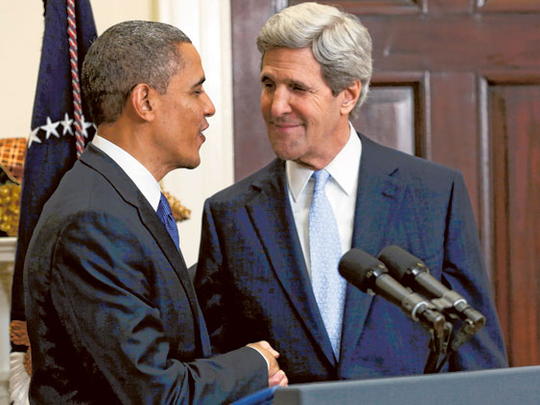
Manama: John Kerry, the chairman of the Senate Foreign Relations Committee, who has become the first white man in 16 years to be nominated Secretary of State, is likely to stir waters in the Middle East.
The 27-year veteran of the Senate Foreign Relations Committee, which he chaired since 2009 left vacant after Joe Biden became the US vice president, has reportedly made more than 30 trips outside the US since the advent of the Barack Obama administration in January 2009, often as its unofficial special envoy.
“Over these many years, John’s earned the respect and confidence of leaders around the world,” Obama said as he announced Kerry’s nomination. “He is not going to need a lot of on-the-job training.”
The numerous meetings with leaders in the Middle East have earned him a sound reputation for expressing moderate views and planning positive engagement moves.
However, in the complex Middle East, easily the world’s toughest neighbourhood, such attributes are not necessarily appreciated.
Israeli media have reported that his stance on Israeli policy, and particularly the one preached and adopted by Prime Minister Benjamin Netanyahu, was “ambivalent.”
“Considered a friend of Israel, Kerry is also a staunch critic of Israel’s settlement policy,” Ynetnews said. “In 2009 he embarrassed Prime Minister Benjamin Netanyahu when he came out against Israeli settlement construction during the latter’s visit in Washington.”
For the media, Kerry also spearheaded efforts to tighten relations between Washington and Syria and has been accused of engaging Hamas in a dialogue.
“He may be a friend of Israel but is not considered the standard bearer for Israel at the Senate,” a state official said. “Other senators are more prominent in that respect. His positions on the Palestinian issue are pretty clear and he is fiercely critical of the settlements,” Ynetnews reported.
An Israeli foreign ministry official who was not identified by Ynetnews reportedly said that “the biggest question troubling Israeli officials is whether Kerry will seek to make a mark on the Palestinian issue as secretary of state”.
“If he wants to leave a mark and influence the peace process, he will increase pressure on Israel,” the official said. “His status allows him freedom of action. He is old enough, rich enough and respected enough. It is now a question of history.”
Kerry, 69, is reportedly the richest man to become Secretary of State in modern times.
Another daily, Israel Today, reported that “Israel is not all that thrilled by President Barack Obama’s choice.”
“While Kerry is generally seen as a friend of Israel in the US Congress (his voting record on Israel is ‘clean’), there are some problem spots as far as Jerusalem is concerned, and Kerry has been somewhat condescending regarding Israeli concerns in the past,” it said.
Kerry became in February 2009 the highest-level US official to visit Gaza after Hamas seized control of the Strip 19 months earlier. However, he did not meet any Hamad official.
In Damascus, the official Syrian news agency SANA posted an international news agency report about Kerry’s nomination, but did not add any comment.
Syrian President Bashar Al Assad is believed to have met Kerry several times between 2000 and 2011, including in February 2009 shortly after US President Barrack Obama’s inauguration.
According to a February 20, 2009 cable released by Wikileaks, Kerry reportedly told Lebanese Prime Minister Fouad Siniora that “he and his Senate and Congressional colleagues were clear that any engagement with Syria would under no circumstances be at the sacrifice of Lebanon’s sovereignty.”
“He clarified that he advocated engagement not as a reward for bad behaviour, but because he believes lack of engagement works to the disadvantage of the United States. He added that he hoped Assad would interpret US outreach responsibly,” the cable said.
In 2009, reports emerged that Kerry “might go on a mission to speak with Iranian officials” as part of the Obama Administration plan to “keep a channel open for exploring the possibility of returning to engagement.”
The report was later denied.












